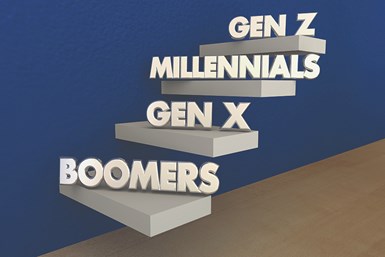Stereotyping Generations Can Lead to Missed Opportunities
Our workforce consists of Baby Boomers, Generations X, Y and Z. They have grown up in different worlds. But does stereotyping our employees by generation help or hurt our leadership?
#pmpa

Our workforce generations look like alphabet soup: Generations X, Y and Z. They all grew up with different social issues, political issues, economic issues and technologies. Here’s the breakdown:
- Baby Boomers (born 1946-1964)
- Generation X (born 1965-1976)
- Generation Y/Millennials (born 1977-1995)
- Generation Z/Centennials (born 1996-present)
We value our workforce and know it’s easier to maintain a good employee than to find one, so it’s tempting to turn to stereotypes to determine what a generation is expecting from a leader. But age is only one aspect of a performer. A State of the American Workforce from Gallup states, “For Millennials, Generation X and Baby Boomers, Gallup’s research shows that focusing on ‘opportunity to do best’ and ‘mission and purpose’ are the strongest factors for retaining employees. In addition, ‘opportunities to learn and grow’ is an important element for the two younger generations, while ‘supervisor cares’ strongly influences Baby Boomers.”
Featured Content
I love data. Data makes sense and can help decision- making. I’m sure all of the above findings ring true — as a generalization. But don’t make the mistake of using a single piece of data to define our employees. Can you use a single piece of data to define a part you make? I would hope that every employee wants an opportunity to do best, serve a mission and purpose, have a supervisor who cares, and opportunity to learn and grow. If not, that has more to do with work ethic than age, and you may need to find a new employee.
There are a multitude of articles that will stereotype the generations and explain how to manage them. But determining how to manage someone just by their age could result in missed opportunities. The current stereotypes that Baby Boomers fear technology or that Millennials are entitled and don’t want to work hard is unfair. In my experience, Baby Boomers have dealt with so much change in their lives that learning technology is just one more change. Millennials have to work as hard as anyone to achieve a goal. And Generation Z is entering the workforce during a pandemic — talk about challenging. So why pigeonhole your employee’s potential?
The Harvard Business Review reported on a study which concluded generational differences are insignificant. Ironically, what the generations thought of themselves differed from what others thought of them. It’s all perception and, although perception can be reality, it doesn’t have to be.
So how does that affect your leadership? Keep in mind that employees — regardless of age — have different motivations, frustrations, conflicts, preferences and values. As a leader, try to recognize your own biases and don’t just use one data point to determine your employees’ potential. See each employee for their skill set, experience, ambition and work ethic.
About the Author
Carli Kistler-Miller
Carli Kistler-Miller, MBA, has over 20 years of experience with communications, event/meeting planning, marketing, writing and operations. Email cmiller@pmpa.org at PMPA.
RELATED CONTENT
-
Subscribe to PMPA Podcasts
"Speaking of Precision" is a podcast from Industry expert Miles Free III, in which he talks about precision machining. All episodes may be found on major platforms.
-
Steel Defects Slivers on Rolled Steel Products
Steel defects slivers are, by their very nature, “injurious defects,” and as such rejectable.
-
Precision Machining Jobs Account for 7 of the Top 25 High Paying Jobs — No College Degree Required
Those who hire in the precision machining industry have a persuasive point for prospective employees who don’t hold — or want to go into debt to hold — a college degree.






